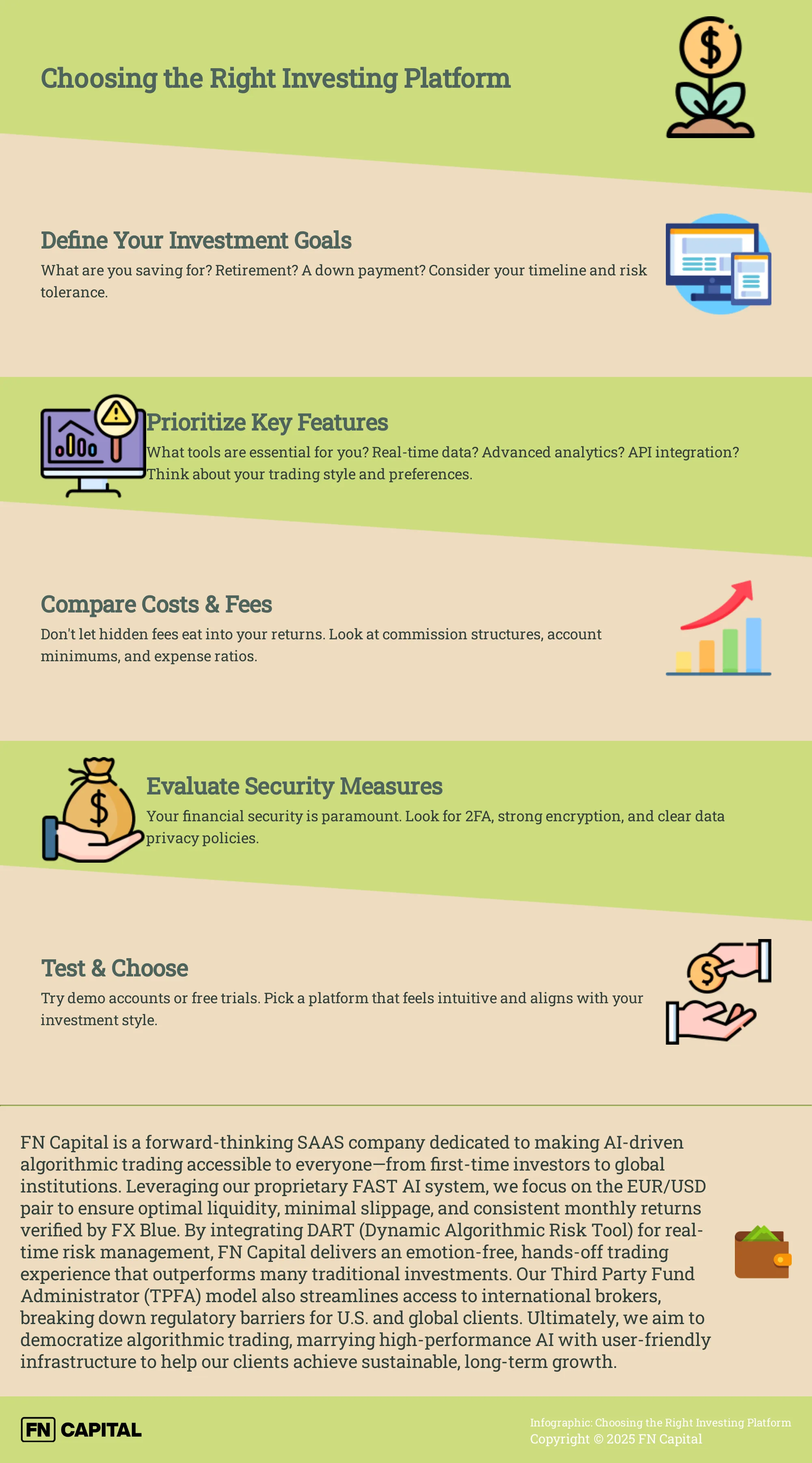Let’s face it, managing your finances can feel like debugging a complex codebase. You need the right tools to diagnose the problem, implement solutions, and track your progress. When it comes to investing, the best investing platforms for tech professionals offer the precision and control you’re accustomed to in your daily work. Think advanced analytics, real-time market data, and the ability to automate your strategies. This guide will break down the key features to look for, helping you choose a platform that empowers you to make data-driven decisions and potentially achieve your financial goals.
Key Takeaways
- Choose a platform that empowers you: The best platform offers a seamless user experience combined with powerful analytics, real-time data, and the flexibility of API integration. Think custom dashboards and automated trading strategies.
- Harness technology to your advantage: Use data-driven insights and explore automated investing to potentially boost returns and streamline your portfolio management. Consider tech-focused ETFs and backtesting to refine your approach.
- Protect your investments: Prioritize platforms with robust security measures, including strong two-factor authentication, encryption, and clear data privacy policies. Your financial security is non-negotiable.
What Are Investing Platforms for Tech Professionals?
Investing platforms designed for tech professionals go beyond basic trading. They’re built for analytical minds, providing the tools and features you need to make informed investment decisions. Think of them as finely tuned instruments for managing your finances, offering a level of control and insight that surpasses the average brokerage account.
Professional investing platforms have become comprehensive tools, providing advanced analytics, real-time market data, and robust risk management features. They often include access to sophisticated research, giving you a deeper understanding of market trends and investment opportunities. Professional investing apps now offer features comparable to Wall Street systems, including advanced charting and algorithmic trading. This puts the power of institutional-grade tools directly in your hands.
For a more hands-off approach, automated investing platforms, or robo-advisors, are increasingly popular. These platforms use algorithms to manage investments based on your goals and risk tolerance, simplifying wealth management. Keep in mind that even advanced platforms like BlackRock’s Aladdin are primarily for institutional investors and might not be suitable for individual use. Choosing a platform that aligns with your needs and experience level is key.
Top Investing Platforms for Tech Professionals
Picking an investing platform can feel overwhelming with so many options available. To help narrow your search, I’ve highlighted some popular choices, focusing on features that often appeal to tech-minded folks. Remember, the “best” platform truly depends on your individual needs and preferences.
Interactive Brokers
Interactive Brokers (IBKR Pro) is known for its low costs, broad range of investments, and powerful research tools. Active traders often gravitate toward IBKR because of its speedy trade execution and tiered fee structure. You can even enjoy commission-free trading on stocks and ETFs through their TWS Lite platform. For higher-volume traders, the TWS Pro platform offers competitive, volume-based pricing.
Fidelity Investments
Fidelity consistently ranks high among investors, praised for its low fees and comprehensive offerings. It’s a solid all-around choice, particularly strong in full-service features, ETFs, and cash management options. Like many platforms these days, Fidelity offers $0 commission for stock and ETF trades, a definite plus for maximizing returns.
Charles Schwab
Charles Schwab is a great starting point for newer investors, thanks to its wealth of educational resources and user-friendly platforms. They also offer $0 commission for stock and ETF trades, providing access to a wide range of investment choices without the added cost. Check out their learning center to get up to speed on investing basics.
Webull
Webull’s user-friendly platform, advanced trading tools, and fast execution are a natural fit for the tech-savvy. It even offers access to IPOs. Just be aware that fees for bonds and foreign stocks can be higher on this platform. If you appreciate a modern interface and robust analytical features, Webull is worth exploring. For more information on pricing and features, visit their website.
E*TRADE
E*TRADE is known for its highly-rated mobile apps, combining ease of use with a full suite of features. With $0 commission for stock, ETF, and mutual fund trades, it’s a convenient and accessible option for managing your investments on the go. Learn more about their mobile offerings.
Robinhood
Robinhood’s intuitive interface and educational resources make it a popular choice for beginners. However, it’s worth noting that its investment options and customer service have received some criticism. If you’re looking for a more comprehensive platform, you might want to consider other options. Their website offers a clear overview of their services. For additional insights, you can also explore reviews and comparisons from reputable sources.
TD Ameritrade
TD Ameritrade’s platform makes it easy to track your portfolio balance across different industries and percentages, a helpful feature for maintaining a diversified investment strategy. This visual approach to portfolio management can be particularly appealing to those who appreciate data visualization. Explore their platform features for more details.
Prioritize These Key Features
As a tech professional, you’re likely comfortable with sophisticated software and demand efficiency. Your investing platform should be no different. Here’s what to look for:
User-Friendly Interface and Mobile Apps
A clean, intuitive interface is crucial for quick analysis and order execution. You shouldn’t have to hunt for the tools you need. A robust mobile app lets you manage your portfolio from anywhere, giving you the same flexibility you expect from other professional tools. Look for platforms that offer advanced charting, algorithmic trading, and a seamless user experience across all devices.
Advanced Analytics and Data Visualization
Data is at the heart of every tech professional’s work, and investing is no different. Your platform should offer more than just buy and sell buttons. Robust analytics, real-time market data, risk management tools, and comprehensive research capabilities are essential for informed decisions. Clear data visualization features will help you quickly grasp market trends and portfolio performance.
Real-Time Market Data Access
In today’s fast-moving markets, real-time data is essential. Delayed data can lead to missed opportunities or poorly timed trades. Professional-grade platforms provide real-time market data, allowing you to react quickly to market changes and execute trades with precision. This is a must-have for active traders and anyone serious about maximizing returns.
Algorithmic Trading Capabilities
Automation is transforming every industry, including finance. If you’re a tech professional, you understand the power of algorithms. Look for platforms that offer algorithmic trading capabilities. This allows you to automate your trading strategies based on predefined rules and backtested models, freeing up your time and potentially improving your returns.
API Integration and Customization Options
For tech-savvy investors, API access opens a world of possibilities. You can integrate your investing platform with other tools, create custom dashboards, and even develop your own automated trading algorithms. Platforms like BlackRock’s Aladdin demonstrate the power of API integration for institutional investors, offering a highly customizable and scalable solution. While not all platforms offer this level of customization, it’s a valuable feature to consider for maximum control and flexibility.
Compare Costs and Fees
When evaluating investing platforms, understanding the fee structure is crucial. Don’t let hidden costs eat into your returns. This section breaks down common fee types, highlighting what to look for and how to minimize expenses.
Commission Structures and Free Trading Options
Many platforms now offer $0 commission trades for stocks and ETFs. Fidelity, for example, is consistently recognized for its commission-free trading and wide range of investment options. Similarly, Interactive Brokers provides a tiered commission structure, offering $0 commission for basic trades and scaled pricing for active traders who need advanced features. Make sure to compare these structures and choose the one that aligns with your trading frequency and needs.
Account Minimums and Maintenance Fees
Some platforms require minimum account balances, which can be a barrier for new investors. SoFi Robo Investing, for instance, stands out with its low $50 minimum, making it accessible to beginners. Compare this to others like Wealthfront (with a $500 minimum) and Schwab Intelligent Portfolios ($5,000 minimum) to see how these requirements fit your budget. Also, be aware of potential maintenance fees charged annually or quarterly for simply holding an account.
Watch Out For Hidden Costs
Beyond commissions and account minimums, watch out for hidden fees that can impact your overall returns. SoFi, while offering a low entry point, now charges a 0.25% annual management fee. This highlights the importance of reading the fine print. Pay attention to expense ratios of ETFs and mutual funds, as these costs can accumulate over time. Also, be wary of promotional offers; while a bonus can be a nice perk, it shouldn’t be the deciding factor when choosing a platform. Prioritize a platform that aligns with your long-term investment goals and offers transparent, competitive pricing.
Pros and Cons of Popular Platforms
Choosing the right investing platform is a personal decision. Here’s a breakdown of the pros and cons of some popular options, keeping in mind what tech-savvy investors like you might find important.
Interactive Brokers
Pros: Interactive Brokers excels in advanced trading tools, technology, and broad market access. It’s a good fit for experienced traders comfortable with a robust platform. Investopedia has recognized them for their international trading, algorithmic trading, and risk management tools.
Cons: Interactive Brokers offers commission-free stock and ETF trades on their TWS Lite platform, but costs can scale up with trading volume on their TWS Pro platform. This, along with the platform’s complexity, could be a hurdle for newer investors.
Fidelity Investments
Pros: Fidelity Investments is known for low fees, a wide selection of investment options, and comprehensive features. Their $0 commission for stock and ETF trades makes them attractive for cost-conscious investors.
Cons: While generally well-regarded, Fidelity’s platform can sometimes feel overwhelming due to the sheer number of features available.
Charles Schwab
Pros: Charles Schwab is a great option for beginners, thanks to their extensive educational resources and user-friendly platforms. They also offer $0 commission for stock and ETF trades.
Cons: Customer service reviews have been mixed, with some users mentioning long wait times.
Webull
Pros: Webull offers a solid range of securities, low fees, and a user-friendly platform with an active trading community. Their educational resources are a bonus for those new to investing.
Cons: Webull’s customer service has received some negative feedback. The platform also lacks in-house research and advisory services, which more experienced investors might miss.
E*TRADE
Pros: E*TRADE’s mobile apps are known for their user-friendliness and comprehensive features, making trading on the go easy. They offer $0 commission for stock, ETF, and mutual fund trades.
Cons: E*TRADE doesn’t offer fractional shares or cryptocurrency trading. Some customer reviews also mention issues with customer service and occasional technical glitches.
Advanced Tools for Tech-Savvy Investors
For tech-minded investors, harnessing the power of today’s digital tools is key to making informed decisions and potentially maximizing returns. Let’s explore some must-have features:
Robo-Advisors and Automated Investing
Automated investing platforms, often called robo-advisors, are changing the wealth management landscape. These platforms use algorithms to manage investments based on your risk tolerance and financial goals. This hands-off approach is perfect if you’re comfortable letting an algorithm handle your portfolio. Robo-advisors typically offer diversified portfolios, automatic rebalancing, and lower fees compared to traditional advisors. They’re a great option for beginners or anyone who prefers a streamlined, tech-driven approach.
Backtesting and Strategy Optimization
Many professional investing platforms offer advanced analytics, real-time market data, and risk management features. Backtesting lets you test investment strategies against historical data. This helps you refine your approach and potentially avoid costly mistakes before risking real capital. Look for platforms that offer robust backtesting capabilities, including customizable parameters and detailed performance reports. This data-driven approach empowers you to make informed decisions based on historical trends and market behavior.
Social Trading and Community Features
Some investing apps now offer social trading features, allowing you to connect with other investors and share ideas. You can even replicate the trades of successful investors. This community aspect can be a valuable learning experience, especially for those newer to investing. It also fosters a collaborative environment where you can discuss market trends and strategies. However, remember that past performance doesn’t guarantee future results, so always do your own research before following anyone else’s trades. Consider these features a supplement to your own analysis, not a replacement.
Security and Data Protection Measures
As tech professionals, we understand the critical importance of security in every facet of our digital lives, and investing is no exception. Robust security measures are non-negotiable for any investing platform. Here’s what to look for:
Two-Factor Authentication Methods
Strong two-factor authentication (2FA) should be a baseline requirement. This adds an extra layer of security beyond your password, typically involving a code sent to your phone or email. Many platforms now offer app-based 2FA, which is generally considered more secure. Don’t settle for platforms that don’t offer robust multi-factor authentication (MFA) options. It’s a simple yet powerful way to protect your assets.
Encryption Standards and Protocols
Data encryption is the backbone of secure online transactions. Look for platforms that use up-to-date encryption protocols, both in transit and at rest. This ensures your personal and financial information is protected from unauthorized access. Sophisticated encryption protocols are becoming increasingly common, often coupled with AI-driven fraud prevention measures. This offers greater peace of mind for investors.
Data Privacy Policies and Compliance
Understanding a platform’s data privacy policies is crucial. Reputable platforms will clearly outline how they collect, use, and protect your data. Compliance with regulations like GDPR and CCPA is essential, especially for those of us concerned about data privacy. Platforms must navigate complex privacy regulations, including the SEC’s new cybersecurity disclosure rules and the Digital Operational Resilience Act (DORA) in the EU. Transparency and adherence to these standards are key indicators of a platform’s commitment to security.
Choose the Right Platform
Picking the right investing platform is like choosing the right tech stack—it needs to fit your specific needs and goals. Don’t rush this process. Take your time to research and compare different options before committing.

Assess Your Investment Goals and Style
Before you even start browsing platforms, take a moment to define your investment goals. Are you a long-term investor aiming for steady growth, or are you more interested in short-term, potentially higher-risk opportunities? Your investment style will heavily influence the features you’ll need. Consider factors like fees, available assets, and your preferred trading style, as advised in Investopedia’s guide to online brokers.
Evaluate Platform Technology and User Experience
For tech professionals, a clunky interface is a non-starter. You need a platform that’s as intuitive and efficient as the tools you use every day. Look for platforms with advanced analytics, real-time market data, and robust risk management tools. Many professional-grade investing apps now offer advanced charting, algorithmic trading, and user-friendly interfaces comparable to Wall Street trading systems. Test out a few platforms with demo accounts or free trials to get a feel for their user experience.
Consider Customer Support and Educational Resources
Even seasoned investors need support sometimes. A reliable platform should offer responsive customer service and helpful educational resources. Forbes emphasizes the importance of these factors when evaluating brokers. Look for platforms that offer clear documentation, tutorials, and readily available customer support channels. Investopedia, for instance, highlights Charles Schwab’s excellent educational resources and user-friendly platform.
Maximize Your Investment Potential
As a tech professional, you understand the power of data and automation. Apply these principles to your investment strategies to potentially increase your returns and manage risk effectively. Here’s how:
Leverage Data-Driven Decision Making
Forget gut feelings. Modern investing relies on data. Professional investing platforms offer advanced analytics, real-time market data, and comprehensive research capabilities. Use these tools to inform your decisions, understand market trends, and identify potential investment opportunities. Don’t just react to headlines; understand the underlying data. This approach helps you make calculated decisions based on facts, not emotions. Look for platforms that offer robust charting tools, economic calendars, and news feeds to stay ahead of the curve.
Automate Your Investment Strategy
Your time is valuable. Automated investing platforms, often called robo-advisors, can streamline your investment process. Set your risk tolerance and investment goals, and the platform manages your portfolio for you. This hands-off approach can save you time and effort, allowing you to focus on your career and other priorities. Many robo-advisors also offer tax-loss harvesting and automatic rebalancing, further optimizing your portfolio’s performance. If you’re looking for a low-maintenance way to invest, automation might be the right fit.
Explore Tech-Focused ETFs and Emerging Technologies
Consider investing in what you know. Tech-focused ETFs (exchange-traded funds) offer exposure to the growth of the technology sector. These ETFs can be a smart way to diversify your portfolio and potentially capitalize on emerging trends. As a tech professional, you’re uniquely positioned to understand the potential of new technologies. Research different ETFs to find one that aligns with your investment goals and risk tolerance. Remember to compare fees and features across different brokerage platforms to find the best fit for your needs.
Current Promotions and Discounts for Tech Professionals
As a tech professional, you’re likely looking for ways to maximize your returns. Brokerage firms often run promotions to attract new clients, and taking advantage of these offers can give your portfolio a nice boost. Here are a few current deals worth checking out:
-
Moomoo: New clients who open a brokerage account and deposit $100 can get five free stocks. These stocks range in value from $3 to $2,000 each, offering a potentially significant return on a small initial investment.
-
E*TRADE: This platform offers a cash bonus of up to $1,000 or more for new clients. To qualify, open a brokerage or retirement account with a deposit of $50 or more using the code OFFER25 during signup.
-
Webull: Webull offers free stock and ETF trades. They also provide incentives for options trading and access to crypto, alternative assets, and bonds. This can be a great option for tech professionals interested in diversifying.
-
tastytrade: For a potentially larger bonus, tastytrade offers up to $5,000 for new accounts or for first-time funding of an existing account.
Keep in mind that promotions change frequently, so check the latest offers directly on each brokerage’s website. Also, read the fine print associated with each offer to understand any requirements or limitations.
Related Articles
- Best Fintech Trading Platforms for Your Investing Needs – FN Capital
- Tech-Savvy Trader’s Handbook: Tools & Strategies for Market Mastery – FN Capital
- Top 7 Algo Trading Software Platforms (Free & Paid) – FN Capital
- Best AI Investing Strategies for High-Net-Worth – FN Capital – Like a Bank, But Smarter
- Best Robo-Advisors for Hands-Free Investing – FN Capital
Frequently Asked Questions
Which investing platform is best for beginners?
Charles Schwab and Robinhood are often recommended for beginners due to their user-friendly interfaces and educational resources. However, Robinhood’s investment options are more limited. Charles Schwab offers a wider range of investments and stronger customer support, making it a potentially better choice for those starting out.
What should tech professionals look for in an investing platform?
Tech-savvy investors should prioritize platforms with a clean, intuitive interface, robust mobile apps, advanced analytics, real-time market data, and potentially API integration for customization. Algorithmic trading capabilities can also be a significant advantage.
Are robo-advisors a good option for busy professionals?
Yes, robo-advisors are an excellent choice for busy professionals who prefer a hands-off approach to investing. They automate portfolio management based on your risk tolerance and financial goals, saving you time and effort.
How can I minimize investment costs and fees?
Look for platforms offering $0 commission trades for stocks and ETFs. Be mindful of account minimums, maintenance fees, and expense ratios of ETFs and mutual funds. Compare fee structures across different platforms to find the most cost-effective option. Also, be aware of any hidden fees.
What security measures should I look for in an investing platform?
Prioritize platforms with strong two-factor authentication (2FA), robust data encryption both in transit and at rest, and clear data privacy policies compliant with regulations like GDPR and CCPA. These measures help protect your personal and financial information.



